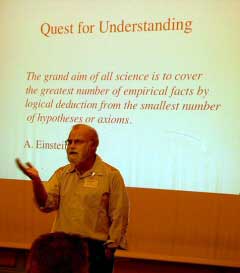
Tributes to Lee Segel
I am extremely sorry to hear that Prof. Segel is not with us anymore.
I remember that I first met him on the train going from the airport to the convention center at Portland during the SIAM annual meeting 2004. Being new to the place, he helped me with the directions. I also had the pleasure of going out to dinner with him one night. His enthusiasm to talk about various aspects during that time is unforgettable. The Panel Discussion that he lead during the conference was very well received.
I join the family members in praying during these difficult times.
Lee was a constant inspiration to, and supporter of mathematical biologists. He last participated in the Gordon Research Conference on Theoretical Biology and Biomathematics in June 2004, where he spoke about extrapolating the future of the field. One of his stories in the talk was a Joe Lewis description of boxing applied to Applied Math - "It ain't stealing!" By which Lee sought to encourage practitioners (whose academic departments might not especially value the field) to persist.
I am honored to have known Lee and have cherished his friendship.
Lee Segel was my ‘scientific grandfather’: my PhD adviser, Leah Keshet, was his PhD student. This relation was not just formal; in many respects, Lee was a grandfatherly figure in my professional life. I met him in 1994, in the middle of my PhD studies in Canada, when I spent a few months in Weizmann Institute as a part of a complicated immigration dodge. Since then, I met quite a few famous scientists who inspired awe, but Lee was one of few who were not only breathtakingly smart and successful, but also unbelievably kind and unselfish. Almost every day, he listened for hours to my naïve pseudo-biomath-blabber, never condescending and always full of advice about science and life, most of which I could not properly understand back then and only years after remembered realizing how much he helped.
For years, I was smitten by the simplicity, elegance and beauty of his papers on early chemotactic models, integro-differential models of biological patterns, neurotransmitter release. His books, especially his famous textbook with Lin, taught my whole generation (and now my students) about proper scaling analysis and art of back-of-the-envelope estimates and of explaining verbally complex mathematical arguments. Most importantly, he was one of the ‘founding fathers’ of the modern mathematical biology who started to make impact on actual biology and who had the courage to model not for the sake of math, but to solve difficult biological questions. For connoisseurs of fine models, his conference talks were always almost sensual feasts
Three things impressed me the most about Lee – the first one was clarity of his science: unlike most of us, he never used mathematical complexity to disguise incomplete understanding, and always found the shortest, straightest, and by default the most beautiful way to solve the problem. The second one was his scientific taste, ability to pick out interesting biological problems with inner mathematical beauty. And the third one was his love and appreciation of life. I did not meet him as often as I would like to, but each time I remember fondly: from eating my first artichoke at his home in Rehovot to having a long walk in the Utah hills. He savored everything – elegant scientific argument, success of his students, crisp mountain air, fresh orange juice, even being a janitor for a few difficult for Israel days, when all younger men were fighting.
I will really, really, really miss him.
Peace be with you. Life is finite, and beyond mankind's control. Up to understanding, you have stepped together in the breath of nature. I appreciate your efforts and contributions, on which I'll walk and walk.

